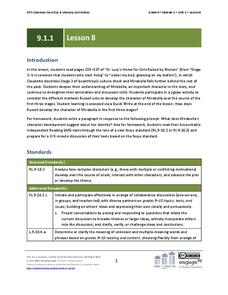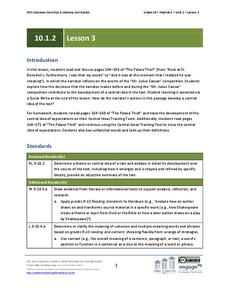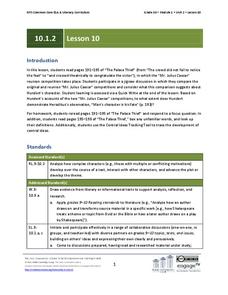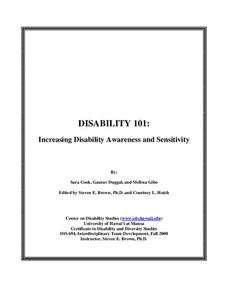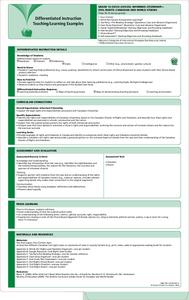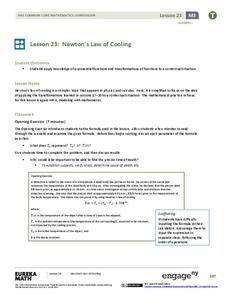Lakeshore Learning
Report Card Comments
Every teacher should keep this document handy when it comes time to writing report cards. It includes a plethora of ideas to look to for inspiration when commenting on student strengths and areas of improvement, behavior/attitude...
Positively Autism
Travis the Train Goes Trick-or-Treating
Travis the Train is on the move again, and this time he and his friends are going trick-or-treating. The story, employing images and concepts introduced in earlier lessons in the series, models behaviors appropriate for the night.
Positively Autism
"Getting Presents at Christmas" Social Skill Story
Here's a social skills story about getting presents at Christmas. Not only does the story explain what to expect, but also details appropriate behaviors when opening and receiving gifts.
Positively Autism
"What to Expect on the Fourth of July" Social Story
The social story "What to Expect on the Fourth of July" not only lets learners with autism know what to expect on this very American holiday, but also explains what behaviors are appropriate when at a fireworks display or picnic.
Positively Autism
Handwashing Task Analysis Data Sheet
Turn on water, put hands in the water, pump soap. Keep track of a learners' steps to independence with a handwashing task analysis sheet that lists nine observable behaviors that can be rated.
Lakeshore Learning
Star of the Week
Encourage good behavior and effort in your class and promote positive reinforcement among classmates by picking a "Star of the Week" throughout the school year. This set of printables will help to get you started!
Novelinks
The Devil’s Arithmetic: Anticipation Guide
Do you need to learn about someone's past before you can understand that person's behavior? Use an anticipation guide to think about the literary themes of Jane Yolen's The Devil's Arithmetic before you begin the novel.
Council for the Curriculum, Examinations and Assessment
Self Concept
Who am I? Who do I want to be? The fourth session in this SPECS health unit explores self-awareness. Class members are asked to reflect on how and why they adapt their behavior to different situations.
Council for the Curriculum, Examinations and Assessment
Relationships and Sexuality
Developing close personal and romantic relationships requires its own set of skills. This session focuses on helping teens develop behaviors and strategies for dealing with romantic relationships, rather than on sharing personal...
EngageNY
Grade 9 ELA Module 1, Unit 1, Lesson 8
You can often track a character's development based on others' reactions to their words or actions. Using Karen Russell's "St. Lucy's Home for Girls Raised by Wolves," ninth graders work in a jigsaw activity to analyze how Mirabella's...
EngageNY
Grade 10 ELA Module 1: Unit 2, Lesson 3
Readers of "The Palace Thief" continue examining Ethan Canin’s short story and consider how the narrator's actions develop the central idea of how one's expectations and the expectations of others influence behavior.
EngageNY
Grade 10 ELA Module 1: Unit 2, Lesson 10
Is man's character his fate? Can actions change character? To track the development of the central ideas in Ethan Canin’s short story “The Palace Thief,” groups compare Hundert's actions in the original "Mr. Julius Caesar" competition...
Curriculum Corner
Planning Binder
An organized classroom is a happy classroom! Keep track of all the important data for your learners with a collection of teacher templates. It includes graphic organizers for class birthdays, transportation, contact information, behavior...
Illustrative Mathematics
Graphs of Power Functions
There are parent functions, and then there are parent functions with a really interesting way to explore them. High schoolers are asked to graph different combinations of parent functions together and determine the point of intersection....
EngageNY
Grade 9 ELA Module 3, Unit 1, Lesson 1
Clear up the misconceptions about autism and individuals on the autism spectrum with an inquiry-based instructional activity. As ninth graders read the first four pages of Temple Grandin's Animals in Translation: Using the Mysteries of...
Odell Education
Scientific Process and Experimental Design
The scientific method keeps you from believing only what you want to believe — it expands your mind. The lesson introduces the eight steps in the scientific process and how to design an experiment to biology scholars. Live insects...
Curated OER
Increasing Disability Awareness and Sensitivity
Designed to promote disability awareness and sensitivity, the five lessons and activities in this packet provide class members with information about disabilities, and with models of behaviors and language that help to break down...
Ontario
Informed Citizenship—Civil Rights
To launch a study of civil rights, class members brainstorm rules and expectations of behaviors at home, in school, in the workplace, and in sports. They then look at civil rights cases and examine the rules embedded in these cases.
EngageNY
The Motion of the Moon, Sun, and Stars—Motivating Mathematics
What does math have to do with the behavior of the earth and sun? Learn how the movement of celestial bodies has influenced the development of trigonometry. Scholars connects the details in mathematics to their real-world meaning.
EngageNY
Why Call It Tangent?
Discover the relationship between tangent lines and the tangent function. Class members develop the idea of the tangent function using the unit circle. They create tables of values and explore the domain, range, and end behavior of the...
Urbana School District
Light
You matter, unless you multiply yourself by the speed of light ... then you energy. Presentation covers the behavior of light as both a wave and a particle, light versus sound, space travel, why objects have colors, depth perception,...
EngageNY
Newton’s Law of Cooling
As part of an investigation of transformations of exponential functions, class members use Newton's Law of Cooling as an exponential model to determine temperature based on varying aspects. The resource makes comparisons between models...
EngageNY
Translating Graphs of Functions
If you know one, you know them all! Parent functions all handle translations the same. This lesson examines the quadratic, absolute value, and square root functions. Pupils discover the similarities in the behavior of the graphs when...
EngageNY
Games of Chance and Expected Value 1
There's a strong chance that class members enjoy learning math through engaging games. Scholars analyze games of chance to determine long-term behavior. They learn to calculate expected value to help with this assessment.
Other popular searches
- Animal Behavior
- Positive Behavior
- Behavioral Ecology
- Learned Behavior
- Behavior Charts and Graphs
- Ethical Workplace Behavior
- Behavior Management
- Behavioral Adaptations
- Innate Behavior
- Behavior in the Workplace
- Inappropriate Behavior
- Behavior Modification











